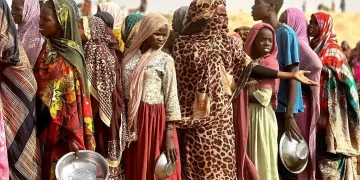Minister of Food and Agriculture, Bryan Acheampong, has attributed Ghana’s ongoing drought challenges primarily to climate change, dismissing irrigation issues as the root cause.
Speaking on Joy News, Mr. Acheampong revealed that the Ghana Meteorological Agency informed the government about a significant shift in the planting season by an entire month, a critical change that farmers were not adequately warned about.
“This shift, driven by climate change, has disrupted our agricultural planning,” Acheampong stated, adding that despite substantial investments in inputs, training, land development, seeds, and fertilizers, these efforts were undermined by altered weather patterns.
“We put in all this money and advised farmers to plant at a specific time, only to find out that the fundamentals had changed. Everything was lost. So it’s a fundamental issue, climate change.”
While acknowledging that climate change is inevitable, the Minister emphasized the importance of irrigation as a key strategy to protect Ghana’s food systems saying, “You cannot do anything about climate change itself because it is a natural cause, but you can put in measures to protect your food system, and one of those measures is irrigation, allowing for all-year planting so that you don’t depend solely on rain-fed agriculture.”
Mr. Acheampong clarified that building irrigation systems is a significant undertaking, different from the smaller earth dams constructed under the government’s “One District, One Dam” initiative.
He defended these initiatives, stating, “These small dams or dugouts were designed to hold rainwater and support farming, livestock, and household needs, and they have largely been successful in meeting those goals.”
He also highlighted the government’s commitment to expanding irrigation, mentioning ongoing projects across the country, stating, “We’re investing in irrigation—expanding Via, Tamni, and Tono, and working on new schemes in places like Echia Manfrum, Kunedu, Pitikun, and Affan Plains.”
He emphasized that “addressing the broader impacts of climate change on agriculture remains an urgent challenge that requires detailed planning and continuous adaptation.”
Mr. Acheampong acknowledged the success of the “One District, One Dam” initiative, saying, “Every dam serves an area of about 15 hectares, providing water for farmers, livestock, and households, and has been largely successful considering what it was built for.”
Read Also: Bisease SHS and Ahantaman Girls’ Win 2024 STEMNNOVATION Roadshow
Source: Audrey Akazum Afolley/ATLFMNEWS



























